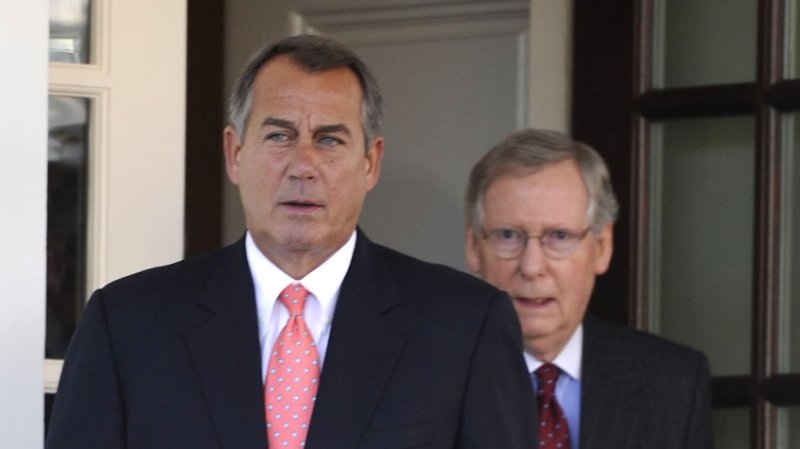1 of 2 | House Majority Leader John Boehner (R-OH), (L) exits the White House as he is followed by Senate Minority Leader Mitch McConnell (R-KY) to address the press after a bipartisan meeting with President Barack Obama at the White House, November 16, 2012, in Washington. UPI/Mike Theiler |
License Photo
WASHINGTON, Dec. 3 (UPI) -- House Republicans responded to the White House's plan to keep the U.S. economy from falling off the fiscal cliff, offering their cuts-and-revenues version.
The counteroffer was delivered to the White House Monday with a letter signed by House Speaker John Boehner, Majority Leader Eric Cantor and four other senior Republicans, including Rep. Paul Ryan of Wisconsin, chairman of the House Budget Committee, architect of the House GOP budget plan and recently defeated vice presidential nominee.
"With the fiscal cliff nearing, our priority remains finding a reasonable solution that can pass both the House and the Senate, and be signed into law in the next couple of weeks," the letter read. "The best way to do this is by learning from and building on the bipartisan discussions that have occurred during this Congress, including the Biden Group, the Joint Select Committee and our negotiations leading up to the Budget Control Act."
The leaders based their offer on the testimony by Erskine Bowles, co-chairman of Obama's debt commission, during the hearings of the Joint Select Committee, dubbed the supercommittee, on reducing the deficit.
The letter noted Bowles recommended "both parties agree to a balanced package that includes significant spending cuts as well as $800 billion in new revenue."
The new revenue proposed wouldn't be achieved through higher tax rates but through "pro-growth tax reform that closes special-interest loopholes and deductions while lowering rates," the letter said.
Obama wants to allow lower tax rates enacted during George W. Bush's presidency for income of more than $250,000 to expire but extend them for the first $250,000 in earnings. Republicans want to extend the Bush-era tax rates for everyone.
The letter said Bowles recommended more than $900 billion in mandatory spending cuts and $300 billion in discretionary spending cuts exceeding the spending reductions enacted in the Budget Control Act.
"This is by no means an adequate long-term solution, as resolving our long-term fiscal crisis will require fundamental entitlement reform," the letter said. "Indeed, the Bowles plan is exactly the kind of imperfect, but fair middle ground that allows us to avert the fiscal cliff without hurting our economy and destroying jobs. We believe it warrants immediate consideration."
The letter also cited the House-passed plan for Medicare reform that has been described as a voucher plan, returning Medicaid to the states and reforming Obama's signature Affordable Care Act, as well as reforming the federal employee compensation and the Supplemental Nutrition Assistance Program.
During a news briefing before the letter was release White House spokesman Jay Carney said a huge obstacle was Republicans' not acknowledging "that there is no deal that achieves the kind of balance that is necessary without raising rates on the top 2 percent wealthiest Americans. The math simply does not add up."
The White House, through Treasury Secretary Timothy Geithner, offered a proposal that includes $600 billion in spending cuts in healthcare and other entitlement programs that comes on top of more than $1 trillion in spending cuts in the Budget Control Act, along with allowing the lower tax rates on the wealthiest taxpayers expire.
Carney said he wouldn't "negotiate the specifics" of an end-of-the-year deal, but said it was "entirely unacceptable to have a repeat performance of what the American people watched with horror in the summer of 2011, which was a willingness by a minority of the overall assemblage of lawmakers on Capitol Hill to hold the American economy hostage" to preserve tax cuts for the wealthiest Americans.
The White House spokesman said Obama wasn't wedded to every detail of his plan" and was willing to compromise.
After the White House proposal was released last week, Boehner said the plan wasn't serious and negotiations were at a standstill.















